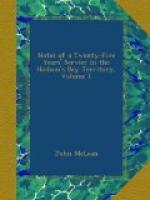The Church Missionary Society has had two Missionaries stationed at Red River settlement for some years past, one of whom is designated the Company’s Chaplain, and is allowed 100l. per annum; the Roman Catholic bishop, too, receives his 100l., and doubtless understands, without any inspiration, the Company’s policy in granting the annuity. The gentleman who conducts the academy has also 100l. a-year; thus we have 300l., forming the sum total of the “great expenses” the Company are at. It is quite true there are thirteen schools at Red River; there are also eighteen windmills, and the Company furnishes just as much wind for the mills as funds for the support of the schools or teachers. Other teachers than those above specified I have neither seen nor heard of.
Some years ago five Missionaries were sent out to the Hudson’s Bay territory by the Wesleyan Missionary Society. After having laboured for some time in the territory, by a decision of the Council the rank of commissioned gentleman, together with the usual allowances attached to that rank, was conferred on them.
The Missionaries had every reason to be grateful for these acts of kindness, and they both felt and expressed their gratitude. Their object, however, in coming to the country was to serve God, not the Hudson’s Bay Company; and they proceeded to discharge their duty in the manner their conscience approved, instructing and enlightening the natives with the zeal and perseverance for which their sect is so eminently distinguished. The good fruits were soon apparent; in some parts of the country successful attempts were made to collect the natives: they were taught to cultivate the soil, to husband their produce, so as to render them less dependent on fortuitous circumstances for a living; they were taught to read and write, and to worship God “in spirit and in truth,” and numbers “were daily added to the Church;” when, lo! it was discovered that the time devoted to religious exercises, and other duties arising out of the altered circumstances of the converts, was so much time lost to the fur-hunt; and from the moment this discovery was made, no further encouragement was given to the innovators. Their labours were strictly confined to the stations they originally occupied, and every obstacle was thrown in the way of extending their missions. Even after some of them had travelled into the remotest parts, and opened up an amicable intercourse with the natives, they were told that collecting the Indians into villages was a measure not to be thought of, as the habitual indolence of the natives precluded the idea of their being induced to cultivate the soil; that even if they were so inclined, the country presented few localities fit for the purpose, &c.
Notwithstanding the high authority whence these allegations emanated, I think I can show the reader that they are in a great measure without foundation.




